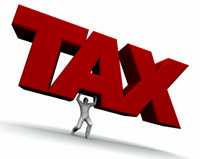Experts say that 2009 is going to be a very difficult year for economy, including the Armenian economy. However, despite the fact that the crisis is growing and the money inflows from overseas is cutting down the government is optimistic and believes that the budget will be fulfilled.
From this point of view a lot of people worry and wander who will bear that heavy load of taxation. In consideration of the fact that as a result of the crisis a number of big companies are in bad financial conditions (especially those in the field of mining and raw materials extraction) it is logical that this heavy load will have to be born by small and medium businesses. This danger is more realistic due to the recent legal amendments in the taxation field, which the government say is law targeted at weakening the load on small and medium businesses but critics say it is targeted at embezzling small businesses. Even though this law concerns small and medium businesses, the government and prime minister say that their number one target will be big businesses.
This issue is also addressed in the FAQ section of the government’s web page. The question is the following: “Newspapers write that the heavy load of the 2009 budget will be born by small and medium businesses. Is it right?” “The portion of extra budget collections should be taxed from the sector of major companies because the portion of tax collection from small and medium businesses is a very small part of the budget, thus the government cannot connect the potential extra tax collection with small and medium businesses,” reads the answer. It is also written that as a result of the legal amendments entered into force as of January 1 (for example, the provision on defining the VAT taxing limit at 58.35 million dram) it is expected that the tax incomes form the small and medium business sectors should be cut down and this loss of tax incomes should be compensated with tax administration and policies connected with big companies.
To note, one week ago during his interview former prime minister Hrant Bagratyan said that it is a trick because the government will never cut the tree it is sitting on. Besides that, the prime minister says that small and medium business pay 75% of the tax collection, which makes 26% in the entire capacity of the economy. “The big business gives only 25%, including the corporative business,” says Hrant Bagratyan. It is natural that opposition representative Hrant Bagratyan is suspicious to the commitments of the government. However, the problem is that Hrant Bagratyan’s evaluations and opinion are based not so much on his political approaches, but on official facts. Anyone will be suspicious if he/she reads the statistical information of the past years.
It is enough to compare the capacities of the taxes paid by big businesses and see whether such capacities have grown or cut down. By saying big businesses we mean the list of big taxpayers. The latest updated version of the biggest taxpayers’ list was published in January-September 2008. As the taxation department fails to draw the total number of the taxes paid, we calculated it one by one. Thus, during the period of January-September 2008 the biggest 300 taxpayers paid 263 billion dram to the state budget. In the same period of 2007 they paid 218 billion. The other figures are brought in Chart 1, which was made based on the information provided by the state incomes committee and National Statistics Service.
It seems to be good because compared to 2007 the biggest taxpayers (which is the same as the biggest businesses) paid 20% more. However, the total capacity of tax collection increased by 32%. It means that the extra tax collection heavy load was not carried by the mentioned biggest businesses. It is proven by the last line of the chart too, which shows that the total capacity of taxes paid by big businesses has fallen.
This information is provided only for the period of January-September 2008, the entire list for 2008 has not been published yet. In consideration of the fact that a number of major companies slowed down their business activities, as well as in consideration of the negative expectations of this year, it is expected that the information concerning the next accounting periods will be more pessimistic.
It is not so important either because the heaviest load will be born not by big, medium or small businesses, but the consumers and society as it has been so far. The capacity of tax collection shows this too because the capacity of indirect taxes is rather big and tends to growing. Specifically, the value added tax, which is included in the final price of products, is the bearer and most important component of our taxation system. Chart 2 shows (the information is downloaded from the web page of the ministry of finances) the tax incomes and VAT of the past three years.
As you can see, the capacity of VAT has rapidly grown during the past three years. As for VAT, everyone is paying this tax, when we buy cigarettes, pay for electricity, VAT is included in the final price. In other words, based on the above mentioned information it is hard to believe that the government will target the big business. As people say, experience is important. Let’s see what will happen.

